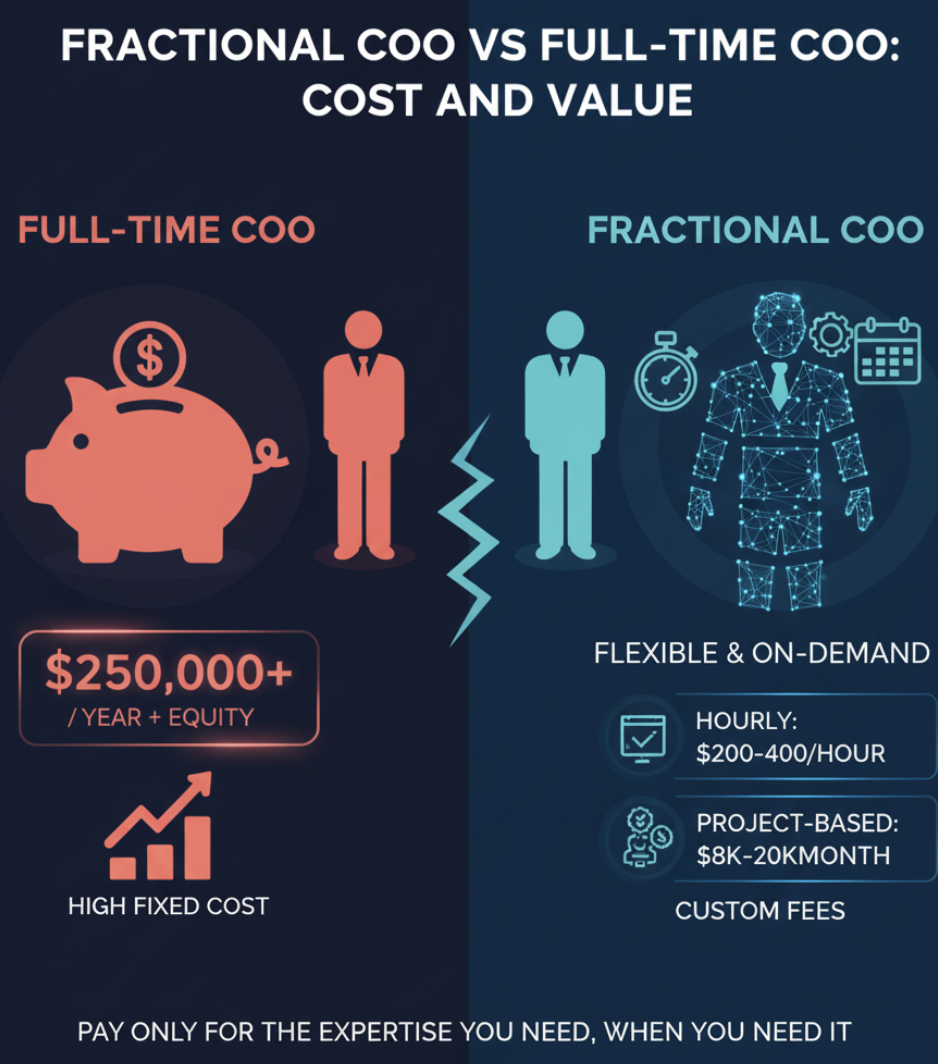Introduction: When Growth Outpaces Structure
Many startups and scaling companies hit the same wall: growth outpaces systems. Sales spike, new markets beckon, and product development accelerates—but operational bottlenecks drag momentum. Hiring a full-time Chief Operating Officer (COO) feels too costly or premature. This is where a fractional COO can step in.
At NeoGig, we connect businesses with on-demand executive talent. If you’re asking, should I use a fractional COO to scale operations?—this guide unpacks exactly when and why the answer is yes.

What Does a Fractional COO Do?
A fractional COO provides high-level operational leadership without the overhead of a full-time hire. They typically:
- Audit and streamline business processes
- Oversee cross-departmental efficiency
- Implement scalable systems and tools
- Guide organizational structure and hiring priorities
- Advise leadership teams on execution strategy
Unlike consultants who only advise, fractional COOs embed into your operations, ensuring execution happens.
Scenarios Where a Fractional COO Delivers ROI
Scaling companies often face critical turning points. Here’s where fractional COO leadership shines:
1. Rapid Growth
When demand suddenly accelerates, teams can’t keep up. A fractional COO helps prevent breakdowns by:
- Introducing scalable workflows
- Aligning resources with growth forecasts
- Mitigating risks of burnout and missed deadlines
2. Entering New Markets
Expanding into new geographies or product lines requires operational foresight. A fractional COO:
- Builds expansion roadmaps
- Oversees compliance in new regions
- Optimizes supply chain and delivery models
3. Efficiency Bottlenecks
If your company is scaling but profit margins aren’t, inefficiencies may be the culprit. Fractional COOs:
- Identify weak links in operations
- Leverage automation and AI-driven solutions
- Improve team accountability and performance tracking
Fractional COO vs Full-Time COO: Cost and Value
Hiring a full-time COO can exceed $250,000 annually plus equity. For startups, that’s often unsustainable. A fractional COO provides comparable expertise at a fraction of the cost, usually:
- Hourly: $200–$400/hour
- Retainer: $8,000–$20,000/month
- Project-based: Customized fees depending on scope
This flexibility means you pay only for the expertise you need, when you need it.

How AI Enhances the Role of a Fractional COO
Modern fractional COOs often integrate AI-powered tools to accelerate transformation. From predictive analytics in operations to AI-assisted hiring, leaders can move faster and smarter.
Want to explore AI-powered frameworks for better decision-making? Resources like the Prompt Library or AI Advantage eBook provide plug-and-play workflows that many COOs leverage.
Comparison: Fractional COO vs Operations Consultant
| Aspect | Fractional COO | Operations Consultant |
|---|---|---|
| Role Duration | Ongoing / part-time | Short-term project-based |
| Execution vs Advice | Executes + advises | Primarily advises |
| Integration with Team | Embedded in org | External |
| Cost | Flexible, scalable | Fixed per project |
| Strategic ROI Focus | High | Varies |
FAQs: Should I Use a Fractional COO?
1. What’s the difference between a fractional COO and an operations manager?
A fractional COO works at the executive level—setting strategy, building scalable systems, and aligning departments. An operations manager is more tactical, executing daily tasks.
2. How long should I engage a fractional COO?
Most companies see ROI within 6–12 months, though engagements can range from a few months (project-based) to ongoing part-time leadership.
3. Is a fractional COO only for tech startups?
No. While SaaS, fintech, and healthtech companies often benefit, any scaling business can leverage a fractional COO for operational efficiency.
4. How does a fractional COO improve investor confidence?
Investors value operational discipline. Having a seasoned executive—without full-time overhead—signals readiness for scaling and responsible resource management.
5. What are the risks of hiring a fractional COO?
The main risk is misalignment with company culture. That’s why choosing vetted, experienced leaders (like through NeoGig’s network) is critical.
Final Thoughts: Scaling Smarter With a Fractional COO
If your company is growing fast, entering new markets, or stuck in bottlenecks, the answer to should I use a fractional COO? is often yes. You gain senior-level expertise, strategic execution, and AI-enhanced efficiency—without the heavy price tag of a full-time executive.
At NeoGig, we make it simple to connect with vetted fractional leaders across operations, finance, sales, and marketing. Whether you need short-term oversight or ongoing strategy, we’re here to help you scale smarter.







